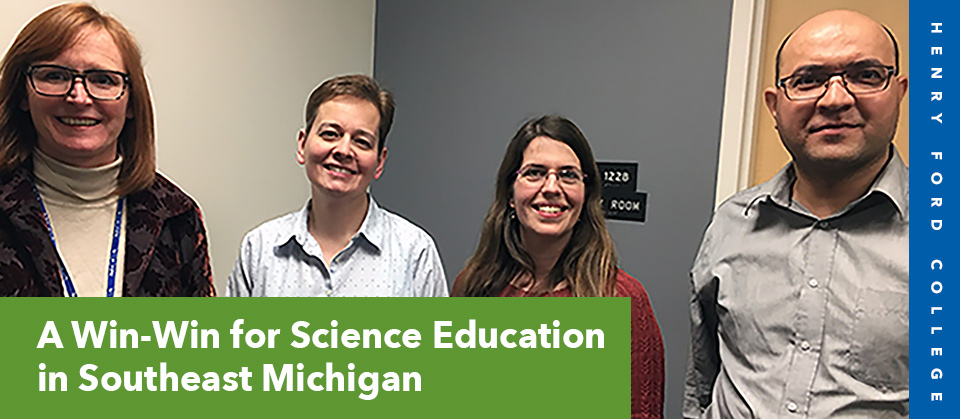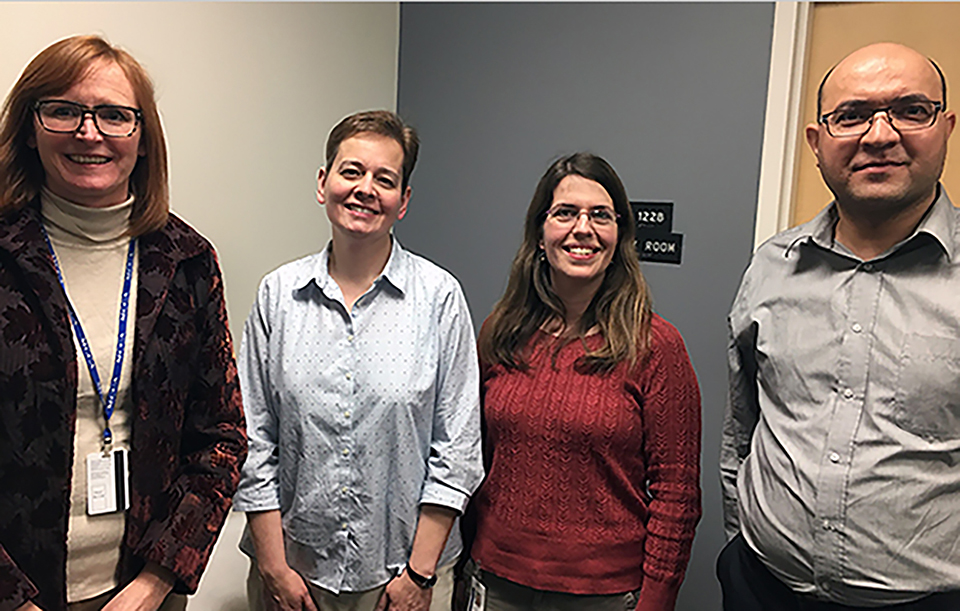 They’re at two different ends of the higher education journey: some just starting on their associate degrees, others finishing up advanced training after earning a doctorate in biomedical science. But there’s a lot they can teach one another, with the help of their professors.
They’re at two different ends of the higher education journey: some just starting on their associate degrees, others finishing up advanced training after earning a doctorate in biomedical science. But there’s a lot they can teach one another, with the help of their professors.
Through a new five-year federal grant totaling $3.64 million from the National Institute of Health (NIH), the two types of “learners” came together for science and engineering education at two of Southeast Michigan’s community colleges.
In late 2016, HFC and the Wayne County Community College District (WC3D) signed on to allow University of Michigan (U-M) Medical School and College of Engineering postdoctoral fellows to co-teach in their classrooms, working alongside their faculty.
The postdocs, who specialize in the fields of physiology and biomedical engineering, get to hone their teaching skills with the help of HFC and WC3D faculty mentors over the course of four years. By planning and teaching a course together, the postdocs can prepare to teach and mentor students when they obtain their first faculty jobs.
 Janice Gilliland, HFC associate dean of the Math and Science Division; Dr. Jolie Stepaniak, HFC Biotechnology professor/coordinator; Dr. Stacey Buchanan, HFC Chemistry professor; and Dr. Hassan Mohseni Nameghi, HFC Engineering professor. All four HFC faculty members will co-teach alongside University of Michigan (U-M) Medical School and College of Engineering postdoctoral fellows over the next four years.
Janice Gilliland, HFC associate dean of the Math and Science Division; Dr. Jolie Stepaniak, HFC Biotechnology professor/coordinator; Dr. Stacey Buchanan, HFC Chemistry professor; and Dr. Hassan Mohseni Nameghi, HFC Engineering professor. All four HFC faculty members will co-teach alongside University of Michigan (U-M) Medical School and College of Engineering postdoctoral fellows over the next four years.
Meanwhile, the associate degree students will receive team-based teaching from the U-M postdocs and the partner college’s faculty members in their engineering and science classes. The students will also have a chance to learn about scientific careers directly from working research scientists and to apply for summer internships working in the same U-M research laboratory as the postdocs.
This program – the Institutional Research and Academic Career Development Award (IRACDA) – builds on initial seed funding provided by U-M’s Provost Office and the Deans of the College of Engineering and the Medical School, coupled with a pilot program at HFC and WC3D. With this new grant, U-M will be able to select three postdocs each year for a four-year stint that will involve teaching, research and mentoring by participating faculty.
The new grant makes U-M the 22nd site in a nationwide network of IRACDA centers funded by the National Institute of General Medical Sciences (NIGMS) over the past 15 years. The program aims in part to address a longstanding lack of diversity in scientific careers.
Both HFC and WC3D have a high percentage of students who are from backgrounds that are under-represented in science. Some of the U-M postdoctoral fellows chosen for the program will also be from such backgrounds, but all those chosen will be committed to careers working with such students.
The first two fellows – neuroscientist Victor Cazares, Ph.D., and computational physiologist Wylie Stroberg, Ph.D. – were chosen as the first two U-M IRACDA Fellows. Candidate trainees at U-M and other institutions nationally will be able to apply for enrollment on an annual basis in what are expected to be highly competitive positions.
More marketable skills all around
“For any postdoctoral fellow, having extra training in teaching skills gives them a leg up as they go out into the job market, and we have fantastic partners at HFC and WC3D to help our fellows enhance their teaching skills. Through this program, they’ll not only develop those skills, but have a chance to inspire the next generation of potential biomedical researchers and research staff,” said Bishr Omary, M.D., Ph.D., chair of the U-M Medical School Department of Molecular and Integrative Physiology and one of the leaders of this effort.
U-M Biomedical Engineering Professor David Sept, Ph.D., the other program co-leader, stated that NIH statistics show that IRACDA fellows were more productive scientifically than traditional postdocs.
In the pilot phase of the U-M program, which provided the data needed to apply for NIH funding, both the mentors at HFC and WC3D and the participating postdocs expressed how pleased they were with this opportunity.
“The feedback we’ve gotten from the teaching mentors has been really gratifying. And the postdocs tell us that it opened their eyes and made them feel that they were really making a difference. They enjoyed it beyond their expectations,” said Sept.
According to Sept, IRACDA fellows and community college faculty will collaborate to review existing curriculum and seek opportunities to include current scientific research in the college courses.
“HFC is excited to be collaborating on the first IRACDA grant in Michigan. Our faculty have a great deal of pedagogical knowledge and classroom experience that they can share with the the postdocs from U-M while at the same time having the chance to update themselves with current scientific research,” Gilliland said.
– HFC Office of Marketing & Communications
